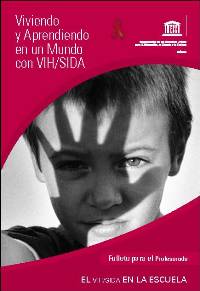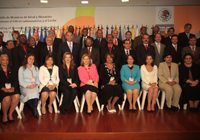Latin America and the Caribbean
UNESCO's response to HIV and AIDS in Latin America and the Caribbean

- © UNESCO
UNESCO's work in the Latin America and the Caribbean region is carried out by the following Field Units and Institutes:
UNESCO Regional Bureaux
Havana Regional Bureau for Culture in Latin America and the Caribbean
Montevideo Regional Bureau for Science in Latin America and the Caribbean
Santiago Regional Bureau for Education in Latin America and the Caribbean
Cluster Offices
Havana Cluster Office
(countries in this cluster office are Aruba, Cuba, Dominican Republic and Haiti)
Kingston Caribbean Cluster Office
(countries under this cluster office are Antigua and Barbuda, Bahamas, Barbados, Belize, Dominica, Grenada, Guyana, Jamaica, Saint Kitts and Nevis, Saint Lucia, Saint Vincent and Grenadines, Suriname and Trinidad and Tobago)
Montevideo Cluster Office
(countries in this cluster office are Argentina, Brazil, Chile, Paraguay and Uruguay)
San José Cluster Office
(countries under this cluster office are Costa Rica, El Salvator, Guatemala, Honduras, Mexico, Nicaragua and Panama)
Quito Cluster Office
(countries under this cluster office are Bolivia, Bolivarian Republic of Venezuela, Colombia, Ecuador and Peru)
National Offices
Guatemala Office for Guatemala
Lima Office for Peru
Mexico Office for Mexico
Port-au-Prince Office for Haiti
Brasilia Office for Brazil
Institutes
UNESCO International Institute for Higher Education in LAC (IESALC), Caracas, Venezuela
The Latin America and Caribbean region presented here follows the specific UNESCO definition which does not forcibly reflect geography. It refers to the execution of regional activities of the Organization.

UNESCO at the XVII International AIDS Conference (Mexico City, August 2008)
More

Handbook for young people, HIV and AIDS, Gender and Human Rights (UNESCO Mexico, UNIFEM and UNAIDS, 2007)
More

UNESCO’s Strategy for HIV and AIDS in Latin America and the Caribbean
More

Regional technical consultation on the International Guidelines on Sexuality Education
Mexico City, Mexico-
From
- 01-09-2009 to
- 02-09-2009
More

Theatre and Visual Arts: A New Approach to HIV and AIDS in Latin America and the Caribbean
College of Art in Havana-
From
- 22-05-2007 to
- 24-05-2007




